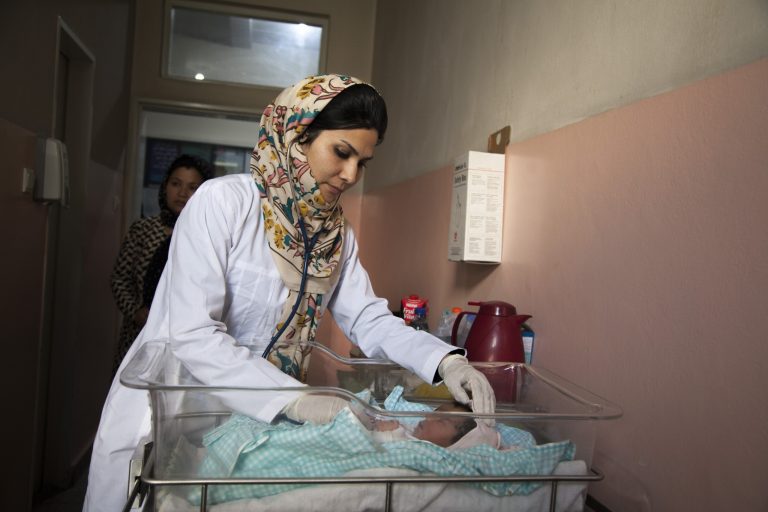I work in the Afghanistan Ministry of Public Health as a midwifery specialist. Until I joined, there weren’t any midwives at the ministerial level. I also work with the Kabul Medical University, where in 2014 we started a bachelor’s program for midwifery. Before that there was only a diploma program. I’m also vice president of the Afghan Midwife Association, and through that organization I do a lot of advocacy on behalf of midwifery. One of our biggest tasks in the Ministry was to revise the nursery and midwifery strategy (2017–2021). I led this work and am happy to say we’ve finalized the strategy and will soon begin implementation.
One of my biggest personal challenges has been working with more experienced midwives whose skills have become outdated. I remember on the first day I came into the classroom, my students said, “Oh my God, this is a very young teacher, she’s our daughter, not our teacher!” But I had studied some new methodologies, including handling adverse outcomes, pain management during delivery, and other subjects that many of my midwives, even some doctors, weren’t familiar with. When I demonstrated an exercise or explained a new method, my students realized I knew what I was talking about, and that I am an “empowered teacher.” They kept me on my toes, though, because they were empowered as well, so I had to keep up to date to have the self-confidence to teach these students.
Just as in my teaching, when I first joined the ministry, the doctors there would say, “She’s just a midwife. She doesn’t know about this or that.” That was disappointing to hear. But after I participated regularly in meetings and made comments and suggestions regarding midwifery, they began to see the value of having a midwife who knows about the situation of mothers and newborns in Afghanistan.
One of my top advocacy priorities is to increase the number of midwifes in the Ministry of Public Health. Midwives must be present and they must be policy-makers. In fact, midwives must be involved in all levels of the health system, from the facility to the ministry. I think the ministry can do more to improve the quality of midwifery as well, including incorporation respectful maternity care into the national health strategy.
Another important need is for a regulatory body that can set standards for midwifery. After consulting with the minister about this, I organized a meeting with stakeholders, including international NGOs. We formed a steering committee and task force for establishment of this regulatory body. If this succeeds it should help us address the quality issue, which is actually more important now than quantity. We have enough midwives, but not enough are qualified.
I always tell my students, “Believe in yourself!” When you believe in yourself you can improve yourself. After that you can improve the situation, and after that you can improve your society. I tell midwives, “Believe in your ability, believe in your power.” The midwife is the first person to touch the mother and baby. That’s a beautiful and important message – the midwife has such an important role.
